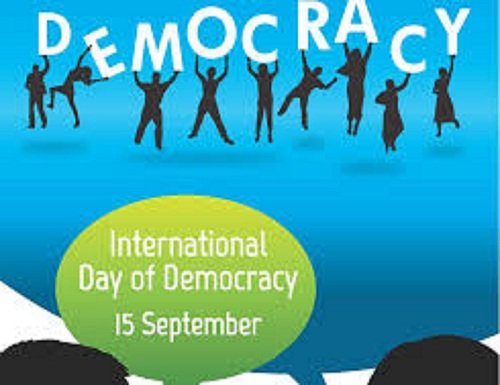International Day Of Democracy,
September 15

International Day Of Democracy,
September 15
The International Day of Democracy is celebrated around the world on 15 September each year. It was established through a resolution passed by the UN General Assembly in 2007, encouraging governments to strengthen and consolidate democracy.
We encourage all our Member Parliaments to mark the day with events and celebrations. Since the day was first observed in 2008, hundreds of parliamentary events have been held worldwide. These have included photo competitions, workshops for children, live televised debates, radio phone-ins and meetings with civil society organizations.
The International Day is an opportunity to review the state of democracy around the world. Each year highlights a specific theme. have included stronger democracies, the importance of democracy for the 2030 Agenda for Sustainable Development, strengthening the voices of citizens, dialogue and inclusiveness, accountability, and political tolerance.
Our support for International Democracy Day stems from our core belief that democracy requires the participation of all citizens. It is an opportunity to highlight the important role of parliaments, and to celebrate their capacity and mandate to deliver on justice, peace, development and human rights.
Our work on International Democracy Day is part of our efforts to build democracy.
International Day Of Democracy,
September 15
The United Nations (UN) General Assembly passed a resolution in 2007 that September 15 of each year would be observed as the International Day of Democracy. Their goal for this day is to promote government’s role in maintaining open democracy among all member nations of the UN Charter and to celebrate the system of values democracy promotes, giving citizens the power to make decisions regarding all aspects of their lives.
In their efforts to advocate for democratic societies around the world, the UN serves a variety of purposes including monitoring elections, working to strengthen democratic institutions and accountability, and assisting nations recovering from conflict to create their own constitution.
From democracy’s birth in ancient Greece thousands of years ago to today, the foundation of a democratic society is the ability of its people to participate in the decision-making process of their nation. This can only happen when everyone is allowed to vote regardless of race, gender or other factors meaning inclusion and equality are also important to the success of a democratic society. In America, we have a representative democracy meaning we elect officials to represent our collective voice to vote on decisions.
As you reflect on your own freedoms and consider the country’s current state of democracy, take inventory of how many ways you participate in the collective-decision making of our country, and support the ideals of democracy.
